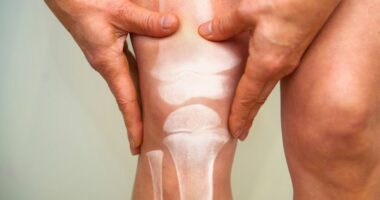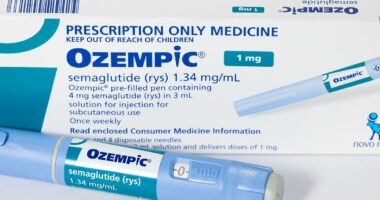Share this @internewscast.com
A groundbreaking new “clot-busting” drug could be a “promising” new treatment for strokes. Research has discovered a medication that could be significantly more effective at treating certain types of strokes than existing therapies.
The drug works by dissolving blood clots in the brain, which are the cause of around 80% of strokes. As part of the new study, which was led by a team at The University of Manchester, scientists tested a compound called caADAMTS13 in mice.
As reported by the British Heart Foundation (BHF), which funded the research, the team believes this could be a significant development for patients who suffer an ischaemic stroke due to a type of clot with a high number of platelets, the small cell fragments that aid blood clotting. Presently, these types of clots are often untreatable with existing emergency stroke therapies.
An ischaemic stroke occurs when an artery supplying blood to the brain is blocked by a blood clot, leading to potential long-term brain damage without treatment.
One of the emergency treatments for individuals experiencing an ischaemic stroke is a drug known as recombinant tissue plasminogen activator(rtPA), which works by breaking up the blood clots blocking an artery.
However, research indicates they are only effective in as few as 10 to 35% of patients and carry a significant risk of bleeding. It’s believed that a protein involved in clotting, Von Willebrand Factor (VWF), may limit the effectiveness of rtPA, as the greater the proportion of platelet and VWF components in a clot, the less effective rtPA is at dissolving it.
The Manchester scientists explored an alternative approach using caADAMTS13, an enzyme that reduces the size of VWF and aids in breaking down blood clots.
Find out about the symptoms you need to watch out for and get health advice with our free health newsletter from the Daily Express
They compared caADAMTS13 with rtPA in mice experiencing a blood clot rich in platelets and VWF. They discovered that, one hour post-treatment, there was a higher restoration of blood flow to the brain in those administered with caADAMTS13.
Professor Bryan Williams, chief scientific and medical officer at the BHF, commented to say: “A stroke is a medical emergency. For every minute blood flow to the brain is disrupted during a stroke, millions of nerve cells can become damaged and die. Stroke remains the single biggest cause of severe disability in the UK and we urgently need new treatments.”
He added: “More research will be needed to understand how these early results in mice can be translated to humans, but this study gives us a promising glimpse into a future where the compound caADAMTS13 could potentially be developed as a new therapy to safely and effectively dissolve blood clots in the brain.”
Symptoms of a stroke
The most common symptoms of a stroke to be aware of using the act FAST acronym are:
Face – The face may have dropped on one side, the person may not be able to smile, or their mouth or eye may have dropped.
Arms – The person with suspected stroke may not be able to lift both arms and keep them there because of weakness or numbness in one arm.
Speech – Their speech may be slurred or garbled, or the person may not be able to talk at all despite appearing to be awake; they may also have problems understanding what you’re saying to them.
Time – It’s time to dial 999 immediately if you see any of these signs or symptoms.
There are two main types of stroke: an ischaemic stroke and a haemorrhagic stroke. Ischaemic strokes are far more common, accounting for about 80% of cases.
These are caused by a blood clot in the brain, whereas a haemorrhagic stroke occurs when a blood vessel supplying the brain bursts. If you think you or someone you know is experiencing a stroke, you should dial 999 immediately.














